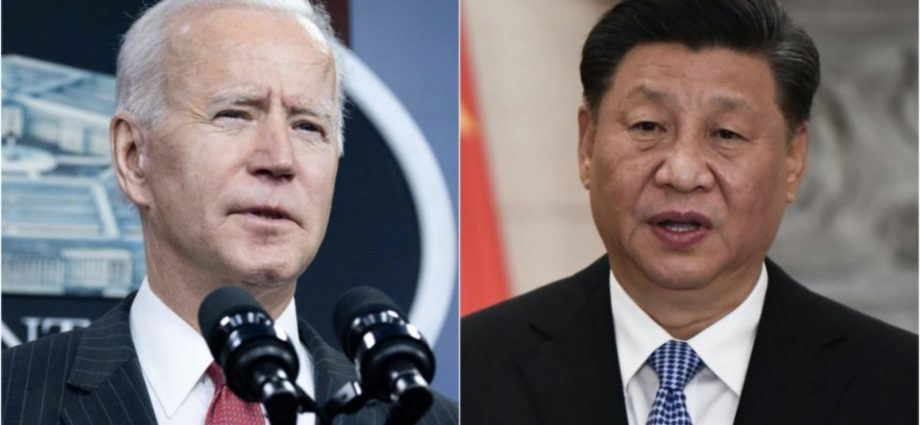
BANGKOK – US President Joe Biden risks snubbing strategic nations if he fails to attend November’s Asia-Pacific Economic Cooperation (APEC) summit in Bangkok, allowing China to bask in the spotlight and expand its regional influence if President Xi Jinping participates in Biden’s absence, political analysts said.
“Chinese President Xi Jinping will be among those attending,” the Bangkok Post reported on November 1, after Thai Foreign Minister Don Pramudwinai announced an APEC update amid international concerns about the spread of Covid and other constraints.
APEC includes Australia, Brunei, Canada, Chile, China, Hong Kong, Indonesia, Japan, South Korea, Malaysia, Mexico, New Zealand, Papua New Guinea, Peru, Philippines, Russia, Singapore, Taiwan, Thailand, the US and Vietnam.
If Xi does attend, Biden would be conspicuous by his absence during the APEC summit on November 18-20.
The White House has announced Vice President Kamala Harris will participate instead of Biden at APEC. Biden will be in Washington at the time to attend instead his granddaughter’s wedding, which is to be held at the White House, according to reports.
“Biden’s absence would not, in and of itself, have a major impact on US-Asia-Pacific relations, as it was always unlikely that he would attend all three November 2022 events in the region – the other two being the G20 in Indonesia and the ASEAN/East Asia Summit in Cambodia,” Benjamin Zawacki, a Bangkok-based Asia Foundation senior program specialist and author of a book on US-Thailand relations, said in an interview.
“The contrast [with Xi’s attendance] will be notable, and duly noted by the press and pundits.
“Washington’s main obstacles are distance and distraction, or put differently, its lack of geographical proximity to much of the rest of the Asia-Pacific, and its necessarily diffuse attention span as a global power,” Zawacki said.
“Few think of the US first and foremost as an Asia-Pacific power, whereas China is synonymous with the term.”
Officials in APEC countries are already weighing the significance of Biden’s absence.
“Delegations to APEC summits are usually headed by heads of state or heads of government,” Thailand’s former foreign minister Kantathi Suphamongkhon said in an interview.
“Symbolism here is important. Sending a lower-ranking official to a summit, would likely be seen as a snub to APEC,” said Kantathi now on the advisory board of the Santa Monica, California-based Rand Corp’s Center for Asia Pacific Policy.
“China will benefit from this by demonstrating its commitment to APEC and the Asia-Pacific region at the highest governmental level, in contrast to the US,” Kantathi said.
Another Thai former foreign minister, Kasit Piromya who was Thailand’s earlier APEC representative, said:
“The non-attendance of President Biden will make the summit less interesting and significant.
“There will be a general disappointment. Thailand will feel a loss of face. There is a perception that the US is too busy elsewhere, the US is too distant and aloof,” Kasit said in an interview.
“The obstacles come from within Washington DC, the lack of political will and motivation, the shortage of expertise and internal communication to come out with common policy measures. People in general are afraid of regime change.”
Biden’s absence will be closely watched in China.
“The US is increasingly absent from Southeast Asia,” said Joe Horn-Phathanothai, a financial advisor in Thailand and China.
“Look no further than the fact they have been without an ambassador to Thailand, supposedly one of their core partners in the region, for three-and-a-half of the past eight years,” he said in an interview.
The US Senate confirmed Robert Godec as the newest ambassador to Thailand on August 4.
“If Xi attends APEC, while Biden does not, it makes China look better vis-a-vis the APEC members, and America look more absent,” Horn-Phathanothai said.
Thailand’s Foreign Ministry spokesman Tanee Sangrat was more optimistic.
“I think the US leader does give Asia-Pacific precedence, especially now that the US is in conflict with other superpowers,” Tanee told reporters.
Anxious to embellish China’s image, Beijing’s government-controlled China Daily occasionally publishes an “All You Need To Know, China Watch” two-page supplement in The Bangkok Post, Thailand’s biggest English-language newspaper.
Alexander MacDonald, an American former member of the US Office of Strategic Services (OSS), which spawned the Central Intelligence Agency (CIA), founded The Bangkok Post after World War II and edited it for eight years.
“This supplement, prepared by China Daily, People’s Republic of China, did not involve the news or editorial departments of The Bangkok Post,” a footnote said, apparently wary of confusing or alienating readers.
China Watch’s top story on September 30 reported:
“With a global vision, Chinese President Xi Jinping has strategically steered the course of the giant ship of the nation in participating in, and guiding the reform of, global governance to make the system fairer and more equitable amid the speedy evolution of the international landscape, experts said.”
China Daily added glowing updates about Beijing’s Belt and Road developmental assistance, infrastructure benefits, and financing.
It also featured China’s high-speed railway “expertise,” including participation in “the Jakarta-Bandung High-Speed Railway in Indonesia, the China-Laos Railway and the Belgrade-Budapest Railway, which links Serbia and Hungary.”
APEC members are expected to learn more about these and other Chinese “accomplishments” directly from President Xi.
Richard S Ehrlich is a Bangkok-based American foreign correspondent reporting from Asia since 1978.
Excerpts from his two new nonfiction books, “Rituals. Killers. Wars. & Sex. — Tibet, India, Nepal, Laos, Vietnam, Afghanistan, Sri Lanka & New York” and “Apocalyptic Tribes, Smugglers & Freaks” are available here.

